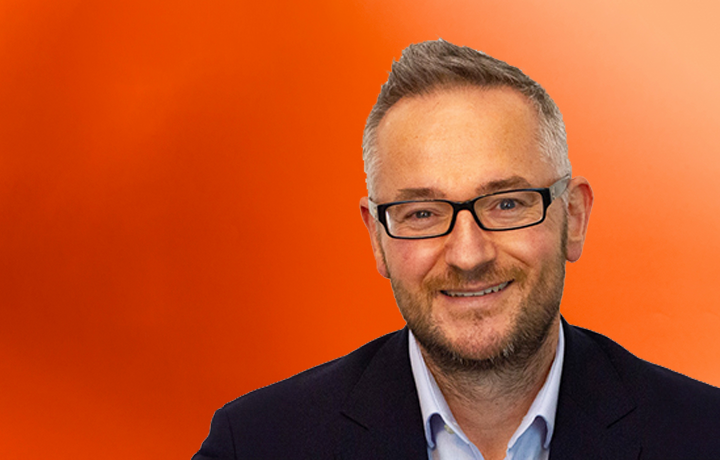
Navigating the intersection of psychology and AI: A conversation with Andy Wishart
Chief Product Officer Andy Wishart discusses contract management, entrepreneurship, and the importance of finding balance in one's professional and personal life.

In the latest episode of SYKE’s Legal Dispatch podcast, host Tyson Ballard welcomed Andy Wishart, a seasoned veteran in the legal technology space and Chief Product Officer at Agiloft, for an insightful discussion on the evolution of contract management and the intricacies of product development in a globally distributed team spanning the Pacific Coast to New Zealand.
From his early days as co-founder of Contract Express to his current role at Agiloft, Wishart discussed various aspects of contract management, entrepreneurship, and the importance of finding balance in one’s professional and personal life.
The intersection of psychology and legal tech
Wishart’s academic background in psychology and artificial intelligence sparked his interest in the intersection between the history of AI and psychology, he said.
“In fact, I graduated back in the late ’90s in psychology and artificial intelligence, which is a really bizarre combined degree, particularly way back then,” he said.
He highlighted what he called the “fascinating” connection between cognitive science, linguistics, memory, vision, and technology. This unique perspective sheds light on the human aspect of contract lifecycle management (CLM) and the potential for incorporating psychological insights into legal tech solutions by focusing on human centricity.
“I think advances in AI and generative AI provide a set of toolkits to build something interesting within the contracting space,” he said. “[At Agiloft] we recognize and understand that contracting is a largely human activity. There are humans in every stage of the process when contracting, there are humans involved in the buy-in and the implementation, so we really focus on that humanity.”
The role of product management
Wishart described the dynamic and demanding nature of his role at Agiloft.
Collaborating with cross-functional teams, planning product features, engaging with customers, and participating in external discussions are all part of his daily routine, he said.
“So, long days, lots of calls, lots of discussions about how we move things forward but, yeah, it is an exciting role and it’s an exciting organization to be part of as well,” Wishart said. “We spend a lot of time planning through what are some of the features that we’re going to be building out over the next cycle, the next release cycle, planning ahead as well, working with our product marketing team on our messaging for a new feature, maybe meeting with journalists and analysts to talk about new product launches, as well.”
The “Contract Express” journey
Wishart shared the story of Contract Express, the document automation company he co-founded.
“I knew nothing about legal, I knew nothing about legal technology, although, obviously, legal technology was in its infancy back then. But I saw something in this tech and the idea and this passion of the two or three people around it that I was like, “I’d love to be a part of this,” and joined and I guess the rest is history,” he said.
The strategic approach of targeting top-tier law firms, such as the global law firm Linklaters, proved successful and paved the way for wider market adoption of their technology.
“We were probably way ahead of our time in terms of the market, back at that point,” he said. “There [were] only certain law firms within the market that were really ready for that type of investment in technology.”
He discussed the organic growth of the company, the challenges faced, and the decision to sell it to Thomson Reuters.
“We’d shown really significant growth over a period, particularly the last three years prior to the acquisition by Thomson Reuters, so things were going really well,” he explained. “We felt that, in order to take it to the next level, it needed further investment. We needed to accelerate product development, we needed to get a wider reach from a marketing and go-to-market perspective, and there was some of the realities of the shareholders and the co-founders wanting to find a potential exit, so the timing felt right for everyone.”
Lessons learned and advice for a younger self
Wishart acknowledged the common theme among founders in the legal tech industry – the lack of work-life balance during the early stages of entrepreneurship.
While intense dedication and hard work are often necessary for success, Wishart emphasized the importance of finding moments of joy and relaxation along the way.
When asked about his failures that have led to the successes he experiences today, Wishart said there “have definitely been several” to choose from, but that adaptability and resilience is key.
“I think just the nature of the product management role is that there are going to be certain things that are not going to work out and, obviously, it’s important to recognize that quickly and retrench and figure out an alternative path forward,” he said.
Reflecting on his career, Wishart acknowledged the need for more fun and a broader set of interests outside of work. He advised his younger self to find a balance between passion and personal fulfillment, ensuring that life doesn’t revolve solely around professional achievements.
“I think there had probably been moments in my career where I maybe [had] taken it too seriously,” Wishart said. “So, I think it is important to get a balance. Make sure that you’ve got a balance between work and your interests outside so that you don’t get to this stage in your career and the only topic that you could talk to is a TED talk [about] laundry.”
Conclusion
Wishart’s journey in the legal tech industry offers valuable insights into the world of contract management, entrepreneurship, and personal growth.
From his passion for psychology and AI to the challenges and triumphs of building Contract Express and Agiloft, Wishart’s experiences provide inspiration and lessons for aspiring entrepreneurs.
Ultimately, his advice to find balance and enjoy the journey serves as a reminder that success is not solely defined by professional achievements, but also by personal fulfillment and well-being.
Recent
Posts
Discover how contract management leaders can leverage agentic AI to solve challenging problems and deliver substantial value.
Discover how our integration with Screens enhances AI contract review, negotiation, and confidence with AI on the inside™.
Your CLM needs to be able to flex and scale as much as your organization does as it grows. Learn how to future proof your CLM.





